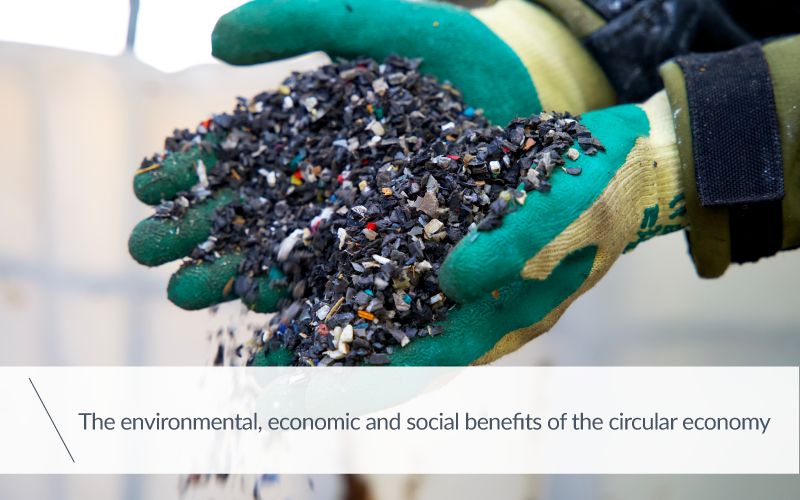
As the world faces increasingly serious challenges like climate change, resource scarcity, and the growing accumulation of waste, the linear economic model - based on "take, make, use, and dispose" - is proving to be unsustainable.
In response to these environmental, economic, and social pressures, the circular economy is proposed as a systemic transformation, capable of combining sustainable development, competitiveness, and social well-being.
What Is the circular economy?
The circular economy is a regenerative model that breaks the link between economic growth and the consumption of finite resources.
Unlike the linear model, it aims to keep products, materials, and resources in circulation for as long as possible through reuse, repair, remanufacturing, and recycling. It is based on three fundamental principles: eliminate waste and pollution by design, keep materials in use, and regenerate natural systems.
This logic requires a radical rethinking of the entire value chain, demanding a systemic change in corporate strategy and operations. The concepts of value creation, capture, and delivery are not simply updated; they are completely reimagined.
The 5 Rs of the circular economy - reduction, reuse, recycling, recovery, and regeneration - not only extend the life of products but also strengthen the resilience of supply chains, making them more flexible and less vulnerable to global shocks.
Environmental benefits
One of the most obvious advantages of the circular economy is the drastic reduction of waste and pollution. Designing products to last longer, be repaired, or be remanufactured limits the production of waste and harmful byproducts. This translates into better air, water, and soil quality, with positive effects on health and ecosystems.
The conservation of natural resources is another central pillar. Recycling and reusing materials reduces dependence on virgin resources like minerals and fossil fuels, helping to safeguard biodiversity and prevent environmental degradation.
The circular economy also has the potential to cut up to 39% of global emissions related to materials, thanks to reduced extraction and the reconfiguration of energy-intensive production cycles. This makes it an essential tool in the fight against climate change.
It's not just about mitigating damage: the circular economy also promotes environmental regeneration through practices like composting, reforestation, and water reclamation, which restore degraded ecosystems, improve soil fertility, and strengthen natural resilience.
Finally, thanks to intelligent product design, the circular economy optimises material use and increases resource efficiency, sustainably meeting a constantly growing global demand.
Economic benefits
The circular economy is not just an environmental choice but a strategic lever for economic competitiveness.
Companies that adopt circular practices can significantly shrink production costs, reducing the use of raw materials starting from the design phase, or with a more efficient waste management system.
Consumers also benefit by gaining access to more durable, repairable, and affordable products. According to estimates, the total savings for the manufacturing sector could reach $640 billion by 2050.
The transition to circular models is also a powerful job creator. Labour-intensive sectors like repair, recycling, reverse logistics, and remanufacturing can create up to 8 million new jobs globally, offering concrete opportunities in an increasingly uncertain job market.
The resilience of supply chains is another crucial advantage. By reducing dependence on critical resources and vulnerable global supplies, companies become more flexible, adaptable, and resistant to crises, as shown during recent global disruptions caused by the pandemic or geopolitical tensions.
In parallel, new innovative business models are emerging, such as "product-as-a-service" leasing, or recommerce, which open new markets and stimulate entrepreneurial creativity. Adopting the circular economy is also a form of risk management: circular companies are better prepared to face emerging environmental regulations, such as the upcoming European Circular Economy Law, expected in 2026.
The role of the European Commission
In preparation for this law, the European Commission announced a new package of strategic measures in July 2025, designed to strengthen the circular transition and support the goals of the Competitiveness Compass and the Clean Industrial Deal.
These actions include:
- Mandatory digitisation of cross-border waste transport from 2026 to improve traceability and legality.
- An evaluation of the WEEE (Waste from Electrical and Electronic Equipment) Directive, aimed at increasing the recovery of electronic waste.
- Public consultations and a review of waste classification to harmonise practices among member States.
- New rules on battery recycling, designed to optimise the recovery of critical materials like lithium and cobalt.
These initiatives confirm that the circular economy is now an integral part of the EU's industrial strategy, with the ambition of doubling the share of recycled materials in the European economy by 2030. Companies that act early will not only be able to comply with regulations but will also benefit from growing incentives, funding, and competitive advantages.
Social benefits
On a social level, the circular economy represents a tangible opportunity to improve the quality of life. Less polluted cities, more efficient waste management, and sustainable urban design create healthier, safer, and more liveable environments for everyone.
Furthermore, the circular economy promotes the autonomy and participation of local communities, supporting initiatives like urban gardens, collaborative repair centres, and recycling projects, which strengthen social cohesion and generate local economic value.
For consumers, the circular paradigm offers greater value, accessibility, and personalisation. Rental clothing, refurbished electronics, or shared goods are not only more economical alternatives but also promote a new way of consuming, based on intelligent use rather than ownership.
Finally, circular practices foster greater transparency and active citizen involvement, promoting more ethical, collaborative, and trusting relationships between companies, customers, and stakeholders. In an era of increasing attention to corporate responsibility, this is a non-negligible competitive advantage.
Reinventing value: the role of manufacturers
To address this transformation, manufacturers play a crucial role. They are the ones who define how goods are designed, made, distributed, and recovered. Reinventing value, therefore, means rethinking every phase of the product life cycle, from modular design to post-consumer recovery.
The adoption of digital technologies like the Internet of Things, Artificial Intelligence, or Digital Product Passports can make supply chains more transparent, adaptable, and circular. However, the transformation doesn't happen on its own: it requires strategic audits, pilot projects, targeted investments, and, above all, a change in mindset.
Overcoming the view of waste as a problem and beginning to see it as a valuable resource for creating value is a profound cultural challenge. But for those who dare to lead this revolution, the path opens toward a more competitive, resilient, and sustainable economy.
Producers willing to be pioneers can build a lasting advantage, aligning economic success with environmental management and social well-being.
Toward a future of sustainable success
The transformation toward the circular economy is not just a challenge but also an unprecedented opportunity.
The companies that can lead this change - by adopting innovative models, investing in digital technology, and overcoming cultural and regulatory obstacles - will be the protagonists of the global market of the future.
Circularity is no longer a simple trend but a strategic imperative that intertwines economic growth, environmental protection, and social well-being.
It is time to embrace this new paradigm decisively, to build a future where value is continuously regenerated, the planet is protected, and society prospers.



